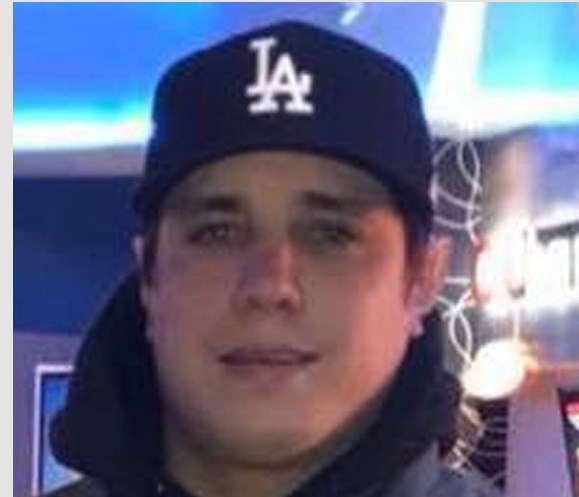THUNDER BAY - Marshall Hardy-Fox, who admitted to participating in the kidnapping of 40-year-old Lee Chiodo that ultimately led to his murder in February 2019, has been sentenced to five years and eight months, but with significant pre-sentence custody agreed upon by a Superior Court judge, he will serve 23 months in custody.
Justice Bonnie Warkentin handed down her sentence in a Thunder Bay Courtroom on Tuesday. Hardy-Fox was first charged with first-degree murder but pleaded guilty to kidnapping and accessory after the fact to murder for his role in Chiodo’s death.
Chiodo’s body was found near 108th Avenue on the morning of Feb. 24, 2019 and he died as a result of a gunshot wound to the back of the head.
Musab Saboon and David Hui were recently found guilty of first-degree murder and kidnapping in connection to Chiodo’s death following a trial that took place in March.
Hardy-Fox testified on behalf of the Crown, telling the court that he agreed to drive Hui and Saboon in exchange for drugs to confront Chiodo over a drug debt at a Memorial Avenue bowling alley the night of Feb. 23, 2019.
According to this testimony, Hardy-Fox said he thought the plan was to take Chiodo to an isolated location and make him walk back alone.
He further testified that Saboon pulled out a gun and began threatening Chiodo. He then parked the car in a dead end near 108th Avenue where Chiodo was removed and he then heard Saboon and Hui discussing what to do and Hui saying ‘I’ll do it.’ Hardy-Fox said he then heard a gunshot after getting back into the car.
“Hardy-Fox was not a drug dealer nor was he an associate of Hui and Saboon,” Justice Warkentin said. “His role was secondary to that of Hui and Saboon.”
However, Justice Warkentin agreed that the charge of kidnapping is a serious offence and, in this case, led to the senseless killing of Chiodo.
“There was no evidence that Hardy-Fox objected to the plan to kidnap Chiodo or his role in carrying it out,” Justice Warkentin said.
During sentencing submissions, defense counsel Michael Hargadon argued that once a gun was produced by Saboon, Hardy-Fox was in fear of his own life and coerced into participating.
“The defense did not introduce evidence in support of this theory but asked the court to draw a conclusion that Hardy-Fox did not have the courage or resolve to object to the plan to murder Chiodo,” Justice Warkentin said.
Justice Warkentin also cited victim impact statements from family members of Chiodo who described the effect his loss has had on the family.
“Both victim impact statements describe the incredible loss of a son and brother who was senselessly murdered over a drug debt,” Justice Warkentin said. “There is no question that the loss of a son or brother, uncle or friend, is heart wrenching.”
Mitigating factors taken into consideration by Justice Warkentin in reaching a sentence included Hardy-Fox’s lack of a criminal record, strong family supports, and taking responsibility for his actions by pleading guilty.
A pre-sentence report and Gladue report were also ordered and Justice Warkentin referred to the lasting impact the residential school system had on Hardy-Fox’s family and community, though she noted that his parents are both professionals with good incomes.
According to the pre-sentence report, Hardy-Fox struggled academically in high school and was diagnosed with a learning disability, but he excelled in hockey. He experimented with drugs and alcohol in high school and later became addicted to crack cocaine in 2018 with his girlfriend, through which he first met Hui and Saboon in 2019.
“He was described as being of good character, a truth teller, a man who adores children, and shares a deep relationship with his grandmother,” Justice Warkentin said of the findings from the pre-sentence and Gladue report.
When given the opportunity to address the court, Hardy-Fox spoke briefly and apologized to the Chiodo family.
“I just want to apologize to Lee’s family for causing any harm to him,” he said. “He didn’t deserve what happened to him.”
Crown attorney Andrew Sadler was calling for a sentence of four to six years on the charge of kidnapping and two years on the charge of accessory after the fact, with credit of 14 months of pre-sentence custody.
The position of the defense was a sentence of 21 months and three years probation, with credit of 21 months pre-sentence custody including 14 months and two days of actual custody with additional six months for restrictive bail conditions that Hargadon said were akin to house arrest.
“I agree with defense counsel that this is a case that warrants a novel range of sentence,” Justice Warkentin said. “I disagree that a global sentence of 21 months resulting in a sentence of time served with probation is appropriate in this case.”
Ultimately, Justice Warkentin sentenced Hardy-Fox to three years and eight months on the charge of kidnapping and two years on the charge of accessory after the fact to be served concurrently.
Justice Warkentin credited Hardy-Fox with 21 months of pre-sentence custody, leaving him 23 months left to serve. Upon his release he will be subject to three years probation.
Hardy-Fox is also required to submit a DNA sample, is subject to a 10-year weapons prohibition, and is to complete any counselling or rehabilitative programs recommended by his probation officer.
Justice Warkentin said she spent a lot of time thinking about her decision and considered both the Crown and defense positions.
“I think you have shown you have a significant opportunity to be rehabilitated and to return to the community and worthwhile employment and reengage with your family and Indigenous heritage,” she told Hardy-Fox.
“I anticipate we will not see you in this courthouse again and I hope through your family support and community that you will become a productive member and be an example to others as you move forward.”
